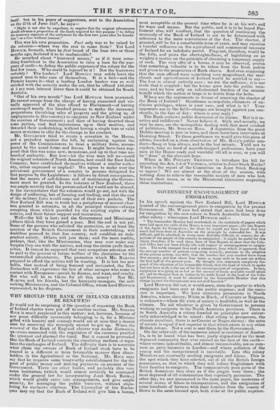WHY SHOULD THE BANK OF IRELAND CHARTER BE RENEWED?
IT would not be surprising if the question of renewing the Bank of Ireland charter were put off to another session. Mr. SPRING Rice is much perplexed in this matter ; not, however, because of any great difficulty necessarily belonging to it, for a Minister gifted with honesty and courage would see at once that a decent case for renewing the monopoly cannot be got up. When the renewal of the Bank of England charter was under discussion, -quIstions connected with the regulation of the currency puzzled th3 ignorant and alarmed the timid. But it cannot be pretended that the Bank of Ireland controls the circulating medium or regu- lates the exchanges of Ireland. The difficulty then is to ascertain what claim the owners of Bank of Ireland stock have to be treated in a different or more favourable manner than share- holders in the Agricultural or the National. Mr. RICE may say that he requires some trustworthy establishment for the de- posit of public money and making payments on account of the Government. There are other banks, and probably this very same institution, (which would almost certainly be continued under the general law for incorporating Joint Stock Banks,) which would gladly enter into arrangements, and give ample security, for managing the public business, without stipu- lating for exclusive charters. The Chancellor of the Exche- quer may say that the Bank of Ireland will give him a bonus, most acceptable nt the present time when he is at his wit's eta for ways and means. But the public, and it is to be hoped Par- liament also. will recollect, that the question of continuing the monopoly of the Bank of Ireland is not to be determined with reference to the mere convenience of the day. The charter, if granted, will he for a considerable term of years, and may exercise a baneful influence on the agricultural and commercial interests of Ireland for an indefinite period. Flagrant, therefore, would be the folly, and gross the shortsightedness, of legislating on so weighty a matter on the principle of obtaining a temporary supply of cash. The very offer of a bonus, it may be observed, proves that something valuable is to be taken from the Irish public and given to the proprietors of Bank shares. And even supposing that the sum offered were something very magnificent, the mer- chants and agriculturists of Ireland would be entitled to say— The loss is almost entirely ours ; we are the sufferers; it is our trade that is crippled : but the bonus goes into the public trees sury, and we have only an infinitesimal fraction of the minute benefit which the nation at large is to derive from the bribe.
Where are the arguments in favour of renewing the charter of the Bank of Ireland ? Gentlemen monopolists, claimants of ex- clusive privileges, where is your case, and what is it ? Your opponents are in the field—charges are brought against you con- stantly, in the face of day : where is your reply ? The Bank eschews public discussion of its claims. But is it in- active and indifferent ? Never believe it. Slyly and secretly, we may be sure, are the monopolists dealing with that most crooked of politicians, Mr. SPRING RICE. A deputation from the great Dublin meeting is now in town, and there have been interviews at Downing Street. To these gentlemen we would give this piece of advice, founded on a close observation of Mr. Rice's public con- duct—Susivet him always, and to the last minute. Yield not to cajolery, take no heed of smooth-tongued professions; have your men in the House ready and watchful till all is over, or you will be "done" at the eleventh hour.
When is Mr. POULETT THOMSON to introduce his bill for amending the Act, 1st of VICTORIA, relative to Joint Stock Banks?
When is the report of the Committee on Joint Stock Banking to appear? We are almost at the close of the session, with nothing done to relieve the reasonable anxiety of men who look beyond their noses, as to the Ministerial intentions respecting these institutions.


























 Previous page
Previous page